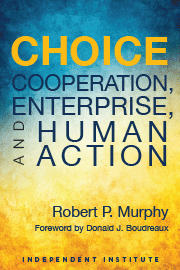“We must also move decisively to secure our critical supply chains,”—this line is so easily sung, and it strikes the unsuspecting ear so musically. Its composer is GOP Sen. Josh Hawley of Missouri. Writing recently in The Washington Post Sen. Hawley joins the choir chanting for government to make Americans less dependent upon non-Americans for critical supplies.
Relatively few of these choir members openly support the near-autarky craved by William Upton, but all insist that a policy that leaves American buyers free of government’s guiding hand will result in dangerous dependence of Americans on foreigners for “critical” supplies. What could possibly be wrong with government efforts to “secure our critical supply chains” and, thus, protect us during emergencies from reliance upon foreigners?
Answer: plenty.
Sen. Hawley and others who issue such demands have not paused to ponder carefully just what any real-world policy of self-sufficiency in “critical supplies” necessarily requires and occasions.
Critical Questions
Begin with this foundational question: Which goods and services are critical and which aren’t? Initially, answering this question seems to present no great challenge: figure out what are our “critical” needs and then, reasoning backwards from this determination, identify those goods and services that satisfy these needs. Easy-peasy.
Yet what, exactly, is meant by “critical?” Most obviously critical are products that sustain our lives. So at the top of the list of “critical” supplies, ahead even of medicines and military weaponry, stands food. Should government, therefore, prevent Americans from importing all foods? If not all foods, surely some foods. But if only some foods, which foods?
A ‘reasonable’ person would agree that only some foods are critical—grains and meats, perhaps, but not tomatoes and maple syrup. Let’s here simply grant that the determination of which foods are, and which aren’t, “critical” is easily-enough made and widely agreed upon.
But answering the question “Which foods are critical?” isn’t enough. We must then ask about the inputs necessary to supply ourselves with our “critical” foods. Chemical fertilizers and pesticides are necessary, as are tractors and irrigation equipment. So, too, are packaging materials, delivery vehicles, fuel, and refrigeration. And don’t forget insurance and financing. Without these inputs, we can neither produce enough of our critical foods nor ship what we do produce to consumers. So to “secure” our supplies of “critical” foods, government must also “secure” earlier links in the supply chain—namely, supplies of “critical” inputs to food production and distribution. But which inputs are “critical?”
To carry out policies of the sort demanded by Sen. Hawley, answering this question about which inputs are “critical” is no less necessary than is answering the question about which outputs are “critical.”
Yet to answer this question about inputs raises further questions about how to secure our supplies of these “critical” inputs. To produce these inputs requires other inputs.
Suppose that tractors are declared to be among the inputs that are part of the “critical supply chain” for ensuring that we Americans can reliably produce our own “critical” foods. Which inputs are “critical” for the production of tractors? Metals, plausibly, are critical. But is rubber? What about paint? (Unpainted farm equipment will be rapidly ruined by rust.) Which of the multitude of ‘beneath-the-hood’ parts of tractors—components such as fuel pumps, carbon-fiber hoses, the ceramic used in spark plugs—are “critical?” These questions must be answered in order to implement Sen. Hawley’s policy.
This example of food and food-production inputs reveals at least two realities that are masked by the fine words quoted above from Sen. Hawley.
A Web Isn’t a Chain
The first reality is that, in our modern economy nearly every productive enterprise is connected to every other productive enterprise. This connectedness is the phenomenon alluded to by the term “supply chain.” This term, however, is highly misleading. Today’s economy is not a series of supply chains running side by side with each other, each largely distinct from, and independent of, the others. If it were, there would indeed be little challenge in pulling in one or more such chains into the domestic economy so that it fully resides there, from beginning to end.
Instead of a collection of distinct supply chains, our modern economy is a single globe-spanning web of interconnectedness. Within this web every output is the product of countless inputs and each kind of input typically is used to produce countless different kinds of outputs. This web of interconnectedness—the complexity of which is beyond human comprehension—is indispensable for our modern mass prosperity. Yet its existence—its ‘everything-is-connected-in-some-way-to-everything-else’ reality—means that there are no objective and clear lines separating “critical supplies” from “uncritical” ones.
Further obliterating the existence of any such objective and clear lines is economic change—both change that is inseparable from a market economy’s creative destruction (for example, the invention of the assembly line), as well as change that is imposed on humanity by nature (for example, the depletion of an iron-ore mine). Such change at every moment rearranges—usually slightly, but sometimes dramatically—the particular connections that each node of the vast economic web has with innumerable other nodes.
In short, the notion that there exist objectively identifiable “critical supply chains” is delusional.
Rent-Seekers Will Seek Rents
Recognition of this delusion should, in turn, alert us to the certain abuse of political power that would occur in the wake of implementing a policy meant “to secure our critical supply chains.”
Because declaring an industry to be “critical” would entitle all domestic firms in that industry to special privileges—protective tariffs as well as subsidies—all “critical” firms would thereby enjoy more sales and higher revenues. Attracted by the benefits of these special privileges, lobbyists for nearly every industry would impress upon government officials the many ways that their firms’ outputs are part of the nation’s “critical supply chains.”
And because each and every firm is indeed part of a vast interconnected web of production and supply, determinations about which industries and firms are “critical” would be—must be—made politically. With no criteria for making such determinations handed down by nature, a rent-seeking free-for-all would be underway.
Do not forget that the government that Sen. Hawley wants to invest with more power to interfere with trade is the same one that continues to run its passenger railroad at loss —the same one that cannot balance its budget even during historic boom years—the same one that deploys the Food and Drug Administration to artificially constrict Americans’ access to health-care products —and the same one that, since the National Health Planning and Resources Development Act took effect in 1974, demands that states use certificate-of-need requirements to restrict the growth of hospital capacity.
Conclusion: The End Result Would Be Near-Autarky
Astute readers might have wondered at my wording when I wrote at the start that relatively few people who wish to “secure our critical supply chains” openly support near-autarky. Did I there mean to suggest that these people support near-autarky clandestinely?
No. Most such people, including Sen. Hawley, surely aren’t consciously acting as secret agents to cut Americans off from the global economy. But the combination of the two realities discussed above makes adoption of a proposal such as that of Sen. Hawley much more likely, in the end, to bring us much closer to autarky.
Because the economy consists not of many distinct and separable supply chains but, instead, of one gargantuan web of interconnectedness—and because public acceptance of protectionism for the purpose of “securing critical supply chains” would drive nearly all industries to plead for protection by pointing out how their outputs are indeed, at some remove, used as inputs for “critical” supplies—the end result will too likely be an America cut off far more dangerously and impoverishingly from the global economy than the likes of Sen. Hawley envision when they cavalierly issue pleas such as the one quoted above.
The quest to use protectionism to make us more secure in our health and wealth would sever untold numbers of productive ties that we now have with the global web of economic interconnectedness. The end result would be an America far less secure in its wealth and health.











